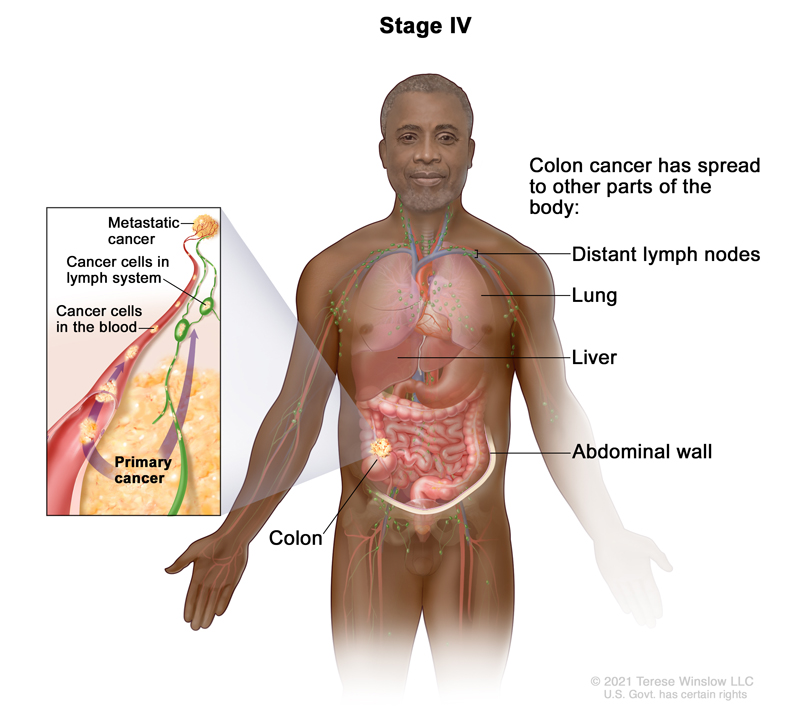Metastatic Colon Cancer is when the cancer has spread from the colon into distant organs and / or tissues in your body. Also called Stage 4 Colon Cancer.
Stage 4 Colon Cancer symptoms may include frequent diarrhea or constipation, rectal bleeding or blood in the stool, cramps, gas or pain weakness or tiredness.
Metastatic Colon Cancer ICD 10 is C79.9.
Tap “Watch Now” for an easy-to-understand overview of Stage 4 Colon Cancer.
- Stage 4A Colon Cancer
- Stage 4B Colon Cancer
- Stage 4C Colon Cancer
Overview
Stage 4A Colon Cancer is when the cancer has spread to one area or organ that is not near your colon, such as the liver, lung or a distant lymph node as shown here.
What Tests Will I Need and Why?
Blood and Imaging tests are done to understand your general health, confirm your diagnosis and determine your cancer stage.
A test, called a Colonoscopy, is usually the first step to see if there is a tumor inside of your colon and if needed, to take tissue samples for analysis. This test, inserts a thin tube with a camera into your anus to see the inside of your colon.
Tissue analysis is also typically done through a biopsy to identify certain biomarkers and mutations, which is critical to finding the best treatment option for you. In Colorectal Cancer, there are 4 common biomarkers that can be found: RAS mutations (NRAS and KRAS), BRAF mutation, Microsatellite Instability High (MSI-H) and HER2. 40-50% of Colorectal Cancers have a RAS mutation.
Re-read this summary as needed and then tap, “Compare My Treatment Options Now“. Our unique Comparison Page will help you understand your FDA-approved treatment options including, who can help you pay for your treatment, where and how each is given and what side-effects you may experience.

National Institute of Health/ treatment-colon
Overview
Stage 4B Colon Cancer is when the Cancer has spread to more than one area or organ that is not near your colon, such as the liver, lung, ovary, or a distant lymph node.
What Tests Will I Need and Why?
Blood and Imaging tests are done to understand your general health, confirm your diagnosis and determine your cancer stage.
A test, called a Colonoscopy, is usually the first step to see if there is a tumor inside of your colon and if needed, to take tissue samples for analysis. This test, inserts a thin tube with a camera into your anus to see the inside of your colon.
Tissue analysis is also typically done through a biopsy to identify certain biomarkers and mutations, which is critical to finding the best treatment option for you. In Colorectal Cancer, there are 4 common biomarkers that can be found: RAS mutations (NRAS and KRAS), BRAF mutation, Microsatellite Instability High (MSI-H) and HER2. 40-50% of Colorectal Cancers have a RAS mutation.
Re-read this summary as needed and then tap, “Compare My Treatment Options Now“. Our unique Comparison Page will help you understand your FDA-approved treatment options including, who can help you pay for your treatment, where and how each is given and what side-effects you may experience.

National Institute of Health/ treatment-colon
Overview
Stage 4C Colon Cancer is when the cancer has spread to the tissue that lines the wall of your abdomen, called the peritoneal surface, and may have spread to other areas or organs as well.
What Tests Will I Need and Why?
Blood and Imaging tests are done to understand your general health, confirm your diagnosis and determine your cancer stage.
A test, called a Colonoscopy, is usually the first step to see if there is a tumor inside of your colon and if needed, to take tissue samples for analysis. This test, inserts a thin tube with a camera into your anus to see the inside of your colon.
Tissue analysis is also typically done through a biopsy to identify certain biomarkers and mutations, which is critical to finding the best treatment option for you. In Colorectal Cancer, there are 4 common biomarkers that can be found: RAS mutations (NRAS and KRAS), BRAF mutation, Microsatellite Instability High (MSI-H) and HER2. 40-50% of Colorectal Cancers have a RAS mutation.
Re-read this summary as needed and then tap, “Compare My Treatment Options Now“. Our unique Comparison Page will help you understand your FDA-approved treatment options including, who can help you pay for your treatment, where and how each is given and what side-effects you may experience.

National Institute of Health/ treatment-colon
Recommended Colon Cancer Videos

Colorectal Cancer Overview

The 4 Stages of Colon Cancer in 3D
Colorectal Cancer Prevention: Dr. Mark Pochapin on Colonoscopy & Polypectomy

How Cancer Spreads
Metastatic = Advanced

Diagnosing Your Cancer
How Does a PET Scan Work?

Diagnosing Your Cancer
How Does a CT Scan Work?

Get Up & Get Moving
From Your Friends @ the Oncology Nursing Society
Commonly Searched Questions
Stage 4 Colon Cancer Survival Rate
According to SEER data, Stage 4 Colon Cancer has a survival rate of 15.1%. For example, if the 5-year relative survival rate for a specific stage of colon cancer is 15.1%, it means that patients who have that cancer are, on average, about 15.1% as likely as patients who don’t have that cancer to live for at least 5 years after being diagnosed.
Source: Cancer.gov
Stage 4 Colon Cancer Symptoms
Colon cancer symptoms are more noticeable in stages 3 and 4. These includes:
- changes in stool color
- changes in stool shape, such as narrowed stool
- blood in the stool
- excessive fatigue
- vomiting
- constipation/diarrhea
- abdominal cramps
- Other symptoms will depend on the organs affected with metastases
Source: Cancer.org
Stage 4 Colon Cancer Treatment
Although stage IV colon cancer means that your tumor has caused metastases, some patients may be good candidates for surgery. Now click here to Compare Your Latest Treatment Options.
Source: Cancer.org
Stage 4 Colon Cancer Definition
Stage 4 colon cancers have spread from the colon to distant organs and tissues. Colon cancer most often spreads to the liver, but it can also spread to other places like the lungs, brain, peritoneum (the lining of the abdominal cavity), or to distant lymph nodes.
Source: Cancer.org
Stage 4 Colon Cancer Prevention
Stage 4 colon cancer is an advanced stage where cancer has spread to distant parts of the body. Although specific prevention for Stage 4 colon cancer is not relevant, general prevention strategies to reduce the risk of developing colon cancer in the first place include:
- Regular Screening: Start screening at age 45, or earlier if at higher risk, using methods like colonoscopy to detect and remove precancerous polyps before they develop into cancer.
- Healthy Diet: Consume a diet high in fruits, vegetables, and whole grains, and low in red and processed meats.
- Regular Exercise: Engage in regular physical activity.
- Maintain a Healthy Weight: Keep your weight within a healthy range.
- Limit Alcohol: Drink alcohol in moderation.
- Avoid Tobacco: Do not smoke.
- Manage Chronic Conditions: Effectively manage conditions like inflammatory bowel disease, which increase colon cancer risk.
Source: Cancer.org
Stage 4 Colon Cancer Recurrence Rate
The recurrence rate for Stage 4 colon cancer can be significant, as Stage 4 indicates that the cancer has spread to distant parts of the body, such as the liver, lungs, or other organs. The exact recurrence rate varies based on several factors, including the specific characteristics of the cancer, the treatments used, and individual patient factors. Typically, patients with Stage 4 colon cancer have a higher risk of recurrence after initial treatment compared to those with earlier stages. For detailed statistics, it’s best to consult Cancer.org’s specific reports or a healthcare provider.
Source: Verywellhealth.com







